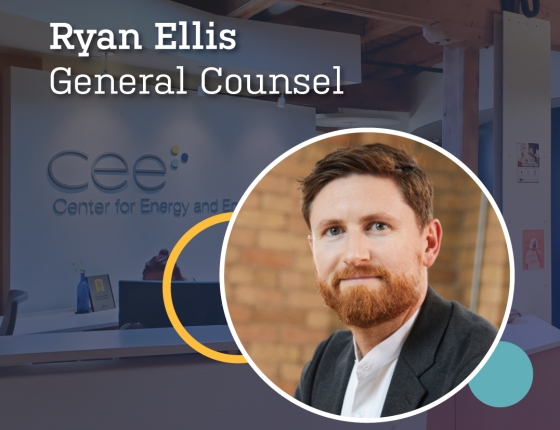Although his father worked as a litigator, Ryan Ellis, CEE’s general counsel, had no intention of becoming a lawyer.
At 18, Ellis enrolled at the University of St. Thomas in St. Paul, Minnesota, to study English and film. But a law career sought him out when, a year and a half after graduating, Ellis and his friends decided to open a nonprofit recording studio.
“The idea was that studio time was so expensive for young, new, small, local bands, so what if we could apply for grant funding and build a new structure to get professional level records made for artists that couldn't afford it,” Ellis said. After meeting with an attorney for a free, thirty-minute consultation, Ellis and his friends realized they'd need a lot more legal help. "But we couldn’t afford it,” he said. “So, I thought that the best way I could contribute was go to law school to focus on intellectual property and corporation law."
By the time Ellis graduated from William Mitchell College of Law in 2012, the group’s priorities had shifted away from the recording studio. “But there I was with a law degree,” Ellis said.
Initially working on large commercial litigation cases, Ellis felt like something was missing.
"I’ve always been drawn to work that has a broader impact. Working in the firm, in the traditional sense of it, I was struggling to reconcile my workload with the purpose of it.”
– Ryan Ellis, CEE General Counsel
Looking for a position that felt more mission-driven, Ellis applied and was hired as CEE’s very first contracts manager in 2017. At the time, he was a team of one.
“My day-to-day is interesting because, if you had asked me even two years ago, it would have primarily been focused on contracts,” Ellis said. As the organization has rapidly grown, and Ellis has built a team, his focus has shifted to areas like legal strategy and corporate risk.
In Ellis' eight years with CEE, his critical support allowed the organization to widen its impact. With his guidance, CEE launched new business endeavors like loan servicing, market transformation, and new major research projects. The latter two have brought the organization’s work across state lines.
“Any time we have a presence in a new state — whether it’s an employee located there, a project or contract focused there, or establishing a satellite office — CEE has to understand the laws and regulations pertinent to doing business there,” Ellis said. By ensuring that CEE covered its legal bases, Ellis enabled the success of new programs in Colorado, Illinois, Michigan, Wisconsin, and Oregon.
“Our role in legal isn’t to say no or create a barrier," Ellis said. “It’s to make sure that we enable more good work because we've taken the steps necessary to mitigate risk and set ourselves up for success."
